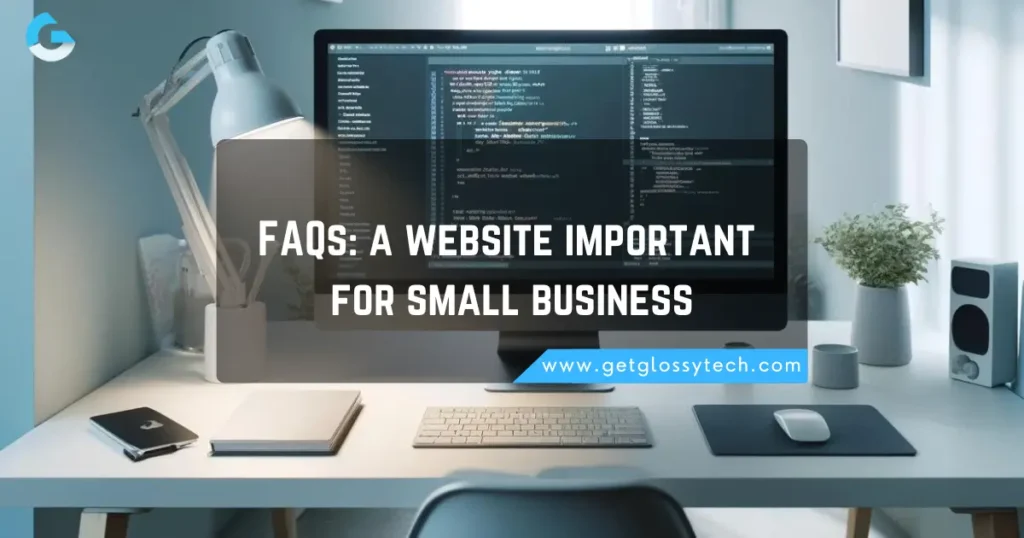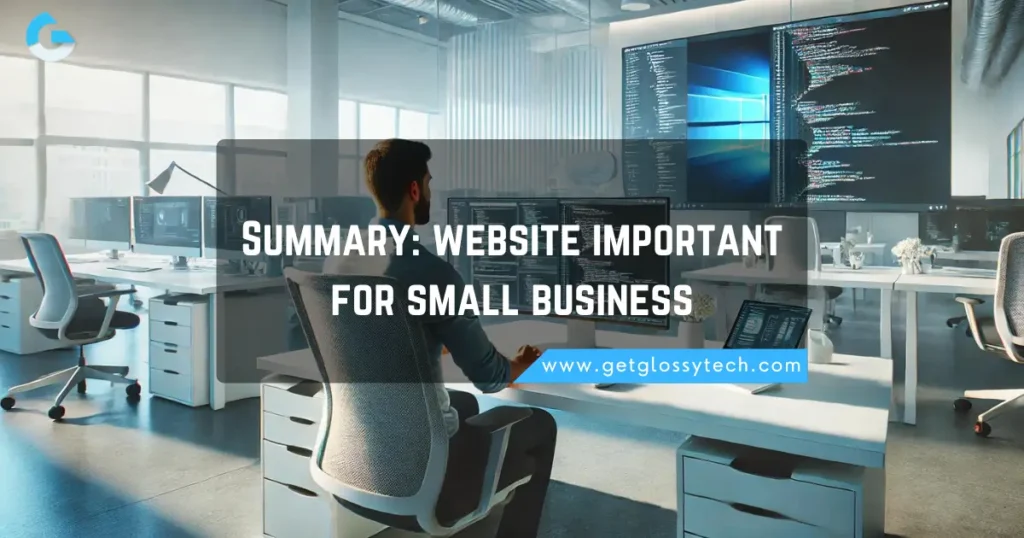Why is a website important for small business

In today’s digital era, having a website is vital for small businesses to thrive. It transforms a local business into a competitive player in the online market, reaching customers far beyond their geographic area.
With the Internet revolutionizing how consumers search for businesses and services, a strong online presence is no longer optional.
The shift from the Yellow Pages to the World Wide Web means that a business must adapt to changing consumer behaviour by utilizing online technologies and digital marketing strategies. A website serves as an essential tool, enabling businesses to capture new opportunities and meet evolving consumer needs, ultimately leading to growth and success.
Top Reasons Why a website important for small business
Here are the Top Reasons Why a Website is Crucial for Small Businesses: Unlocking Digital Opportunities and Growth
1: Rolling Out the Red Carpet

A website acts as the gateway and welcome mat for your business, creating a powerful first impression that can determine the level of customer engagement. It serves not just to display products but to educate the consumer and elicit emotions, making your brand more memorable and relatable.
Consider your website as an open door, inviting customers to interact with your business at any time, which is vital for building lasting relationships and enhancing accessibility.
2: Your Clients Expect an Online Presence

In today’s tech-savvy times, customers anticipate businesses to maintain a professional, user-friendly online presence. A website acts as your virtual storefront—it’s where your clients start to gauge your brand and decide if they’ll engage with your services or purchase your products
Not just a platform, it’s a powerful asset that can promote your business and increase customer recall.
Amplify Your Marketing Messages
A well-designed website centralizes your marketing strategy, effectively broadcasting your brand’s message.
- It provides critical information about your mission and expertise, fostering trust and goodwill with your audience.
- Regularly updated content that’s optimized for search engines helps maintain your competitive edge, attracting more visitors.
- Enhances your visibility and interaction with potential clients, increasing clicks and engagement compared to your competitors.
3: It Proves Your Business’s Legitimacy

In the digital world, a website proves your business’s legitimacy, essential for attracting potential consumers. It serves as a central point to showcase your offerings and expand your reach beyond local borders, driving engagement with a broader audience.
This presence is vital to exist and thrive in today’s global market, turning a small business into a recognized entity in the digital landscape.
4: Your Small Business Requires a Distinct Brand Voice

In today’s digital landscape, your small business’s website serves as more than just a digital footprint; it’s a vital marketing tool that communicates your brand voice. This voice—crafted through the
- Words
- Language
- Tone
You use—tell your story in a way that resonates with your audience. It’s how you creatively express your unique persona and lead the way in making your visitors feel like they
- Know
- Like
- Trust
Creating a memorable experience through your website involves more than just the visuals; it’s about the messaging that represents your company. Every piece of marketing collateral, from email campaigns to social media posts, should echo this voice.
Think of it as the written equivalent of your logo or a catchy jingle—it’s what gets stuck in your head and shapes how people perceive your
- Business
- Products
- Services
For example, consider a well-known local wine store with years of history and a sterling reputation. Their website doesn’t just sell wine; it shares tales of vineyards and vintages, reflects the owner’s passion, and builds a relationship with its visitors. This approach doesn’t just connect; it leads to a devoted customer following.
In essence, your website is a tool—a conversation starter with potential clients. It’s critical that every element, from taglines to content, is carefully crafted and considered to communicate your
- Mission
- Values
- Problems you solve
A professional content writer or brand writer can help craft these messages to ensure they are
- Short
- Memorable
- Conceptual phrases
That truly represents your distinct personality.
5: Your Website Showcases Credibility

In the digital age, a website serves as a crucial bridge connecting your business to prospective buyers. This isn’t just about having an online presence; it’s about crafting a digital presence that embodies trustworthiness and credibility. Remember, first impressions count, and often, your website is the first point of contact for potential customers.
Building Trust through Customer Reviews and Social Proof
Genuine customer reviews and testimonials can significantly elevate your business’s credibility. Displaying reviews from reputable platforms like Yelp or FourSquare directly on your site assures customers that your offerings have been tested and validated by others.
Social proof, whether through user-generated content or video testimonials, builds a foundation of trust and showcases the real-time satisfaction and experience of your clients.
Enhancing Credibility through Professional Website Features
- Dedicated Landing Pages: Tailoring specific landing pages for products or services highlights professionalism and detailed information, aiding in customer decision-making processes.
- Accolades and Certifications: Showcasing awards, badges, and certifications in visible areas like the homepage or footer lends authority and legitimacy to your business.
- Case Studies and Client Stories: Presenting detailed case studies or narratives of client success stories on your site not only illustrates your method and process but also enhances engagement and provides tangible proof of your capabilities.
- User-Generated Content: Incorporating user-generated content, such as images tagged with branded hashtags or comments from social media, serves as powerful social proof, influencing buying decisions by showcasing real customer experiences and satisfaction.
6: Your Website Shapes Your Business Story

In today’s digital age, having a website is crucial for small businesses, not just for sales but for building a brand’s narrative. Unlike
- Print ads
- Snail mail
- Brochures
Which only provides a snapshot, a website lets you control and continuously update your business’s story. It is the most efficient and best way to spread your message, aligning with your vision and mission.
Brand Perception and Content Control
- A website centralizes your brand perception, offering more control over how customers see your business.
- With 5.6 billion searches on Google daily, a search-optimized website puts you in front of potential clients actively seeking your services.
- Accurate, up-to-date content ensures that you control the narrative, minimizing the spread of false information.
- If visitors find outdated or irrelevant information, they’re likely to move on to someone else, emphasizing the need for fresh content.
Master Your Online Presence
In the realm of online marketing, being search-optimized is key. A great-looking, search-optimized website ensures that you not only catch the eye of potential clients but also outrank your competitors in Google searches.
Keeping your contact information, services, and promotions fresh and easily accessible mitigates the risk of false information and ensures you present the most accurate details to your audience.
7: People Need to Find You on Google

A website is vital for any small business aiming to succeed in the digital marketplace. Here’s why:
- Visibility on Search Engines: Most customers start their quest for products and services on Google. Without a website, your business might as well be invisible online.
- Central Information Hub: Your website serves as the main store where potential customers can find your contact form, product and service list, prices, address, and phone number.
- Online Success: A website boosts your business’s accessibility and credibility, key factors in converting searches into sales and inquiries.
By leveraging a website, you ensure your business is directly in the path of customer searches, helping you attract more visitors and potentially increase sales.
8: A Website Optimizes Your Business Operations

For any small business owner or solopreneur, a website serves as a crucial communication platform. It’s not just about having an online presence; it’s about streamlining your business operations.
Businesses can manage everything from content creation to client interactions in one place. This all-in-one solution offers features that help you run and grow your business efficiently.
Streamlining Daily Activities with Integrated Tools
One of the biggest advantages of a well-structured website is its ability to streamline your daily operations. Integrating business tools such as:
They all allow for a seamless experience for both the owner and the clients. These tools help
- Manage appointments
- Process payments
- Ensure that everything from email marketing to sales processes runs smoothly
Expanding Market Reach through E-Commerce and Marketing Features
An effective website can transform a local storefront into a global online brand. Online eCommerce store features allow businesses to sell both
- Physical
- Digital products
Reaching a broader target audience. Moreover, email marketing add-ons enable personalized communication with
- Clients
- Boosting click-through rates
- Fostering loyalty
Automated emails, subscriber form fields, and calls-to-action help in crafting targeted campaigns that drive sales.
In today’s digital age, ignoring the potential of a website means missing out on a plethora of opportunities to streamline operations, expand reach, and scale your business. Leveraging technology not only saves time and energy but also helps you focus more on what you do best—your zone of genius.
9: Round-the-clock customer Support Agent

A website is more than just an online presence for your small business; it’s your round-the-clock customer support agent. Imagine a platform that’s
- Available 24/7
- Ready to answer questions
- Provide information to potential clients and customers at any hour
This is what a well-crafted website does. It encourages people to contact you easily, whether they want to book a call, submit an order, or simply inquire about your products or services.
- Automation Processes: Handle too many phone calls and email inquiries efficiently through your website.
- Clear Listings: Clearly list out all your offerings on the website.
- Effective FAQs: Create effective FAQs to provide specific, detailed information about products and services.
- Pertinent Product Info: Include pertinent info such as prices on your website to reduce the need for customers to search for more details or contact you directly.
- On-Page Information: Ensure customers can find all necessary information right there on the page.
- Add to Cart Button: Include an add to cart button for quick and easy purchases.
- Time-Sensitive Announcements: Use a hello bar at the top of the site for time-sensitive announcements.
- Landing Pages: Provide links to landing pages that offer further information.
- Social Media Integration: Include social media accounts in the footer block or embed your profile with your physical location address.
- Visitor Experience: These features help visitors make an informed decision easily and quickly.
Adding a short intake form or a scheduler for appointments is a bonus that can save both you and your customers time. It’s about making the visitor’s experience smooth, so they can easily pay, book, or contact you without hassle.
By posting all the necessary details, you demonstrate your authority in the field and show that you truly understand your client’s needs.
Tips for Getting Started With Your Website Design Process

By following these steps, your website will not only serve as a powerful marketing tool but will also fully utilize the potential to attract new users and retain existing ones.
- Brainstorming sessions are essential when planning your website. During these sessions, focus on what makes a unique business line and how you can outshine competitors. Consider what catchy and distinctive elements you can integrate into your domain name and overall brand.
- Choose a user-friendly template that reflects your company name and brand. A well-organized navigation system with attractive visuals is key. Ensure that the FAQs, contact information, and clear call-to-action elements are easy to find. This will help guide your visitors to take the desired action, whether it’s to contact you, make a purchase, or learn more about a product.
- Don’t overlook web hosting and server configuration. Opt for a service provider that offers the features you need, such as daily backups, enough storage space, and manageable bandwidth limits. As your business expands or downsizes, ensure your website can economically accommodate changes.
- Keep your content updated. Regularly publish important updates about new products, new services, and any changes to your business. Use Google Analytics or similar analytics tools to track user activity and test new features. Adjust your content and optimize for search engines by integrating targeted keywords and phrases that resonate with your audience.
Need help building a website for your business?
I’ve helped many small businesses upgrade their websites, and I strongly recommend considering a refresh if your site isn’t delivering results. My expertise can help you.
Let’s schedule a quick call to discuss how I can assist in upgrading your site to better meet your business needs and attract more leads. Services include everything from simple tweaks to full redesigns.
FAQs: Why is a Website Important for Small Business

What is the importance of a website?
A website is crucial for establishing an online presence, attracting customers, building credibility, and driving business growth in today’s digital world. It acts as a 24/7 storefront, making your business accessible to a global audience. A well-designed website also enhances customer trust and boosts sales by showcasing your products or services effectively.
What are the 3 common purposes for a website?
- Branding: Establish and strengthen your business identity.
- Lead Generation: Attract potential customers and drive sales.
- Information: Provide essential details about products, services, and contact info.
What is the biggest benefit of offering a website?
The biggest benefit of offering a website is attracting more customers by establishing a strong online presence. A website enhances credibility, making your business more trustworthy and accessible. It also allows for 24/7 customer engagement, driving growth even when you’re offline.
What is the function of a website?
A website functions as a digital platform for businesses to showcase their products or services, attract customers, and build credibility. It serves as an online hub for information, communication, and transactions, helping businesses reach and engage with a broader audience.
Conclusion: Why is a Website Important for Small Business

In conclusion, a website is crucial for small businesses as it enhances visibility, attracts more customers, and establishes credibility. It serves as the foundation of your online presence, helping you reach a wider audience, generate leads, and ultimately drive growth. Without a website, small businesses risk falling behind in a digital-first world.

